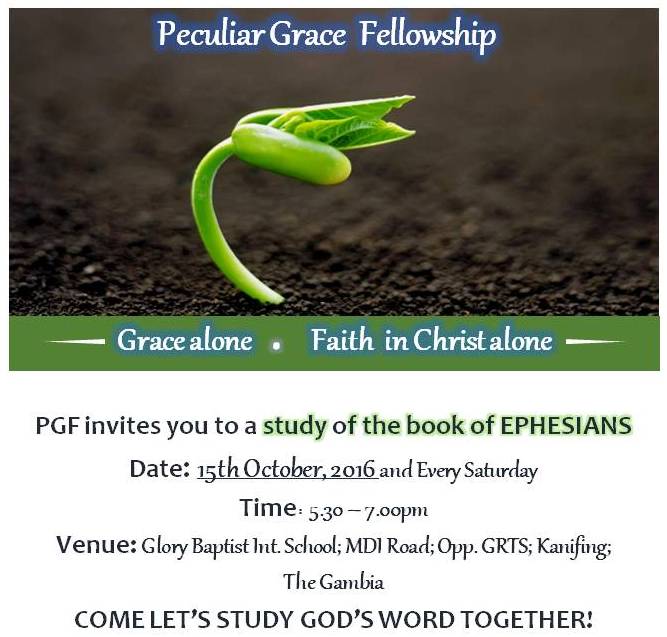
“Grace to you and peace from God our Father and the Lord Jesus Christ.” (Ephesians 1:2).
At our PGF Bible study few weeks ago we asked the question “what do the terms grace and peace in the above verse mean?” Some of the answers that came up for grace included, God’s divine enablement to make us who we are; the ability to do what God wants us to do, and the popular one at the present time, “God in the race” (the extra edge God gives us to run the race of life). With regards to peace, we noted that the common greeting at the time Paul wrote his epistle to the Ephesians and in many parts of the world today (for example in our country The Gambia) is “peace to you”. More commonly, peace is understood to be the period between wars, or the absence of chaos and conflict. However, as we probed further into the text, we realised that the phrase “grace and peace” carry a deeper meaning than is commonly perceived as per some of the popular definitions given above. Within that phrase is a summary of the entire Christian faith. Grace is the beginning of our faith, and peace the end result. Grace is the source of everything that we are and have as Christians. That is why Paul in every one of his epistles always starts and ends with it.
Grace is defined as unmerited favour — simply, favour we have received that we didn’t deserve whatsoever or work for. The Biblical definition of peace on the other hand goes beyond what we find in our history books, namely an absence of wars and conflict. The root meaning of the word really is union after a quarrel, or reconciliation after a period of war or separation.
This is what we read in the second chapter of Ephesians:
For he himself is our peace, who has made us both one and has broken down in his flesh the dividing wall of hostility by abolishing the law of commandments expressed in ordinances, that he might create in himself one new man in place of the two, so making peace, and might reconcile us both to God in one body through the cross, thereby killing the hostility. (Eph. 2:14-16).
The above verses spell out the true definition of peace – reconciliation between man and God, and between man and his fellow human. The question is how does this come about? The answer is in our opening verse “Grace and peace to you from God our Father, and from the Lord Jesus Christ.” We’ll notice that in each instance of the use of these two terms together in the New Testament, Paul never puts peace before grace. This is because it is grace that leads to peace.
In a very striking way, the second chapter of Ephesians expounds our reference text, the second verse of chapter 1.
Paul there begins with a graphic description of the state of man as a result of the fall. Man by nature is at enmity with God. He is a hater of God. The Scriptural description is that we are alienated from and hostile in mind toward God, and the law of God is hateful to us. Sadly, this is the truth about all humans. Fallen man abhors every mention and thought of God and revels in excluding God from his life and the society. In certain places in the world today, it is a crime to pray, mention the name of Jesus or to read the Bible in public. Fallen man by nature wishes that God were not there at all. But man in sin doesn’t only hate God; he also is at conflict with himself, because he is in the wrong relationship with God. The truth is God did not create man to be a god unto himself, but to be under God as His image bearer. Because of his wrong relationship with God, man doesn’t have peace. But the problem is compounded because as a result of sin, we have all become gods unto ourselves and so there is conflict between man and his fellow human being as everyone insists on having their way. The end result is a state of discord and misery.
This description above depicts man’s fallen condition. But the verdict is, man brought this upon himself, and further, deserves punishment for rebelling against God. Nevertheless, it is in this state of hopelessness that the Bible introduces the term “Grace!” The Gospel message is that whilst we were His enemies, God sent His Son to die on the cross to reconcile us to Him.
Paul says in Ephesians 2:4-5:
But God, being rich in mercy, because of the great love with which he loved us, even when we were dead in our trespasses, made us alive together with Christ—by grace you have been saved—
Notice the great “But”. We didn’t deserve mercy, “But God loved us regardless”. We were dead in our trespasses, “But God made us alive together with Christ”. We deserved hell, “But by grace we have been saved”. This is where the Christian life begins. And what is its end? The rest of chapter 2 tells us. Because of the work that Christ has done on the cross, reconciliation with God has been freely offered to all who come to God through Him. All who come through Christ — whether Jew or Gentile — are made new, and together can approach God through the same Spirit (the Holy Spirit). Whilst formerly enemies of God, through Grace we have been reconciled with God.
“Therefore, since we have been justified by faith, we have peace with God through our Lord Jesus Christ.” (Romans 5:1).
The only hope of peace for the world therefore is in Christ Jesus alone, who Himself is our peace (Ephesians 2:14). The wall of hostility between man and God, and between man and his fellow human is broken down the moment we are made one as new creatures in Christ.
This is why Paul is careful to always put grace before peace. How do we who were once enemies of God become reconciled unto Him, and further adopted as His children? Through Christ Jesus alone!


